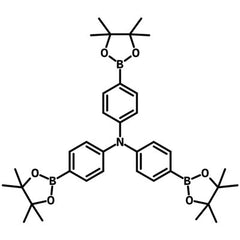Tris(4-(4,4,5,5-tetramethyl-1,3,2-dioxaborolan-2-yl)phenyl)amine
CAS Number 267221-90-9
Boronates, Chemistry Building Blocks, COF Ligands, Materials, Monomers, Porous Organic Frameworks
Covalent Organic Frameworks (COFs) Triarylamine Ligand
A trigonal bridging ligand linker for COFs in applications of effective iodine uptake and supercapacitors
Specifications | MSDS | Literature and Reviews
Tris(4-(4,4,5,5-tetramethyl-1,3,2-dioxaborolan-2-yl)phenyl)amine (TPA-3BO), CAS number 267221-90-9, is a triphenylamine with a boronic acid pinacol ester on the end of each benzene rings. The boronic acid pinacol ester functional groups are ideal for Suzuki cross-coupling reaction to extend the size of the structure. Triarylamine (TAA) derivatives are good electrode materials for their high charge mobilities, excellent thermal stabilities, and high redox activity. Polytriarylamines (PTAAs) allow reversible radical redox reactions to occur through charge/discharge.
Porous aromatic frameworks (PAFs) LNU-58, prepared through Suzuki cross-coupling polymerization of TPA-3BO and 3,5-dibromoazobenzene, can adsorb iodine effectively with an adsorption capacity of 3533.11 mg g-1 (353 wt%) for gaseous iodine, and 903.6 mg g-1 (90 wt%) for dissolved iodine, among the highest level among all porous adsorbents.
Conjugated microporous polymer (CMP) TPA-TAB, with a large BET surface area (490 m2 g -1), demonstrated great thermal stability while being employed as electrode materials in supercapacitor devices. The TPA-TAB CMP showed an outstanding specific capacitance (684 F g -1 at 0.5 A g -1) and long-term stability with a capacitance retention of 99.5% after 5000 cycles (at 10 A g -1) in a three-electrode supercapacitor system.
MOF and COF ligands
Bpin ligand for cross-linked COF networks
Worldwide shipping
Quick and reliable shipping
High purity
>98% High purity
Facile reactions
Bpin possesses excellent reactivity
General Information
| CAS Number | 267221-90-9 |
|---|---|
| Chemical Formula | C36H48B3NO6 |
| Full Name | Tris(4-(4,4,5,5-tetramethyl-1,3,2-dioxaborolan-2-yl)phenyl)amine |
| Molecular Weight | 623.2 g/mol |
| Synonyms | TPA-3BO, 4-(Tetramethyl-1,3,2-dioxaborolan-2-yl)-n,n-bis[4-(tetramethyl-1,3,2-dioxaborolan-2-yl)phenyl]aniline |
| Classification / Family | Triarylamine, COF ligands |
Chemical Structure

Product Details
| Purity | >98% |
|---|---|
| Melting Point | N/A |
| Appearance | White powder/crystal |
MSDS Documentation
 Tris(4-(4,4,5,5-tetramethyl-1,3,2-dioxaborolan-2-yl)phenyl)amine MSDS Sheet
Tris(4-(4,4,5,5-tetramethyl-1,3,2-dioxaborolan-2-yl)phenyl)amine MSDS Sheet
Literature and Reviews
-
An Azo-Group-Functionalized Porous Aromatic Framework for Achieving Highly Efficient Capture of Iodine, Z. Yan et al., Molecules, 27, 6297 (2022); DOI: 10.3390/molecules27196297.
- Constructing conjugated microporous polymers containing triphenylamine moieties for high-performance capacitive energy storage, M. Samy et al., Polymer, 264, 125541 (2023); DOI: 10.1016/j.polymer.2022.125541.
-
Ultrastable Porous Organic Polymers Containing Thianthrene and Pyrene Units as Organic Electrode Materials for Supercapacitors, M. Mohamed et al., ACS Appl. Energy Mater., 5 (5), 6442–6452 (2022); DOI: 10.1021/acsaem.2c00942.
